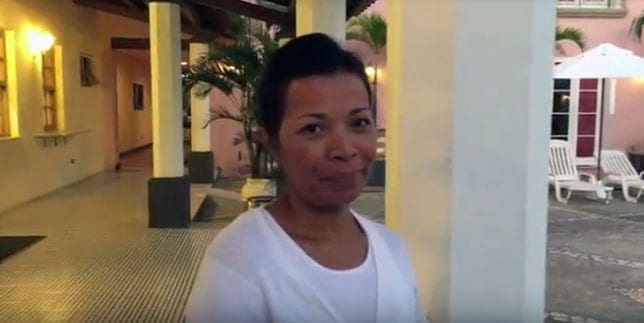
Aug 9, 2018
Marie Constant has worked as a domestic worker in Lebanon since 1997. Originally from Madagascar, Constant has been fortunate to have a good employer. But most migrant domestic workers are not so lucky.
“In general, domestic workers [must] work from morning until evening with no specific break time and no holidays,” she says, speaking in French through a translator. “When we receive guests, we don’t have choice but to stay up late working until the guests leave, which is usually around midnight or sometimes around 1 a.m. Most domestic workers don’t have the right for the weekly leave.”
“And because of these rights abuse, we decided to form a union to defend our rights.”
(Constant discusses domestic workers and the struggle for rights on the job in this Workers Equality Forum video.)
‘We Are Advancing”
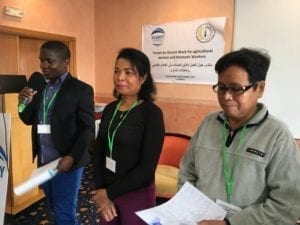
Marie Constant (center), joined other domestic worker rights advocates in Morocco last year for a Solidarity Center forum on decent work. Credit: Solidarity Center/Tula Connell
In 2015, she joined 300 domestic workers at the founding congress of the Domestic Workers Union in Lebanon, the first union of migrant domestic workers in the Arab region.
The union “is a source of great pride for us,” Constant says. Affiliated to the National Federation of Workers’ and Employees’ Unions in Lebanon (FENASOL), the union is yet to be officially recognized by Lebanon.
Much of Constant’s outreach involves informing domestic workers about the options for improving their wages and working conditions.
“We try to reach out to all the domestic workers women in most the regions in order to educate them about their rights.”
Despite the challenges, Constant recognizes domestic workers in Lebanon have taken big steps toward achieving dignity and decency on the job to which they and all workers are entitled, and she is optimistic about the future.
“We have a lot of hope. Even if we know we have a long way to go and that there are a lot of hurdles along the way, we are advancing, not regressing.”
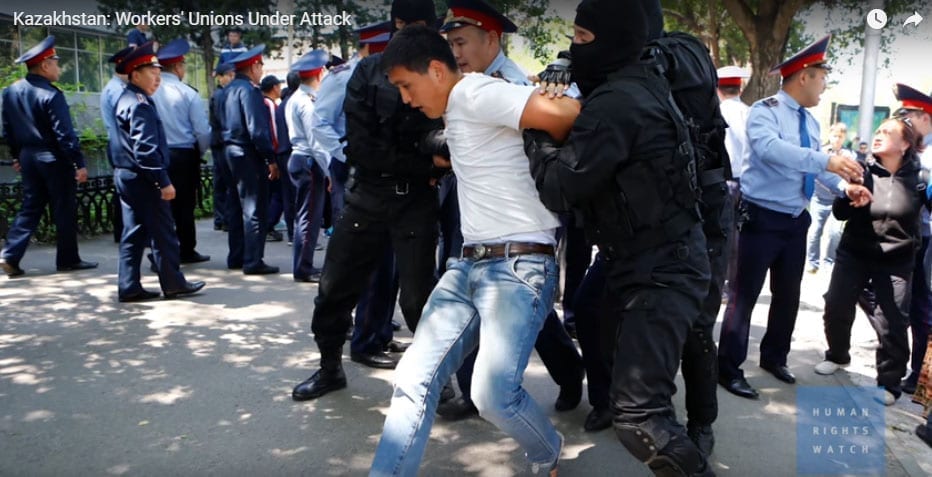
Aug 6, 2018
Human rights activists around the world celebrated the recent release from prison of two union leaders in Kazakhstan who were convicted of bogus criminal charges after participating in a peaceful workers’ protest against the forced closure of the country’s main independent union group, the Confederation of Independent Trade Unions of Kazakhstan (CITUK/KNPRK).
Yet the convictions of Amin Yeleusinov, Nurbek Kushakbayev and 30 other workers who took part in the rally have not been overturned, and trade union freedom there has been curtailed.
The anti-worker environment in Kazakhstan is not unique. Around the world, a pattern of attacks against freedom of assembly and collective bargaining is increasing even in countries with strong democracies within a broader clampdown on human rights and restrictions on civic space.
“Democratic organizing of workers is suppressed and all the democratic spaces to organize are shrinking. Thus, workers are unable to bargain collectively for their fair and just share and to sustain the present unjust economic order,” says Sanjiv Pandita, regional representative for Solidar Suisse in an email.
Worker rights often are the most frequently violated.
“In my opinion this is the biggest crisis of democracy we are facing.”
Murder, Death Threats and Repression
Broadly, more than 3.2 billion people live in countries in which “civic space” is either closed or repressed. Few countries—16 of 134 countries with verified data—are genuinely open, according to CIVICUS, a global civil society alliance that includes the Solidarity Center. One recent study concluded that since the end of 2017, one-third of the world’s population—2.5 billion people—have lived through “autocratization,” in which a leader or group of leaders began to limit democratic attributes and to rule more unilaterally.
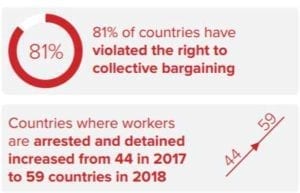
Credit: ITUC
Within this global crackdown on human rights, worker rights often are the most frequently violated. In most countries, unions provide the largest civil space for exercising fundamental human rights freedoms and building democratic societies.
The Global Rights Index 2018 compiled by the International Trade Union Confederation (ITUC) points to increased restrictions on the right to form unions: 65 percent of countries now exclude some workers from the right to establish or join a trade union, an increase from 60 percent in 2017.
The report finds the number of countries where workers were arrested and detained increased from 44 in 2016 to 59 in 2017. Last year, trade unionists were murdered in nine countries: Brazil, China, Colombia, Guatemala, Guinea, Mexico, Niger, Nigeria and Tanzania.
In 2017 alone, instances of repression or attacks against workers seeking to form unions, bargain collectively or rally for their rights ranged from harassment to murder.
Laws Protecting Worker Rights Not Followed
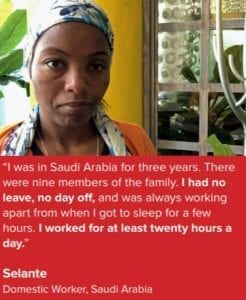
Saudi Arabia is among countries that bars migrant workers from forming or joining unions. Credit: ITUC
A 2016 report on rights to freedom of assembly and association in the workplace by a United Nations special rapporteur found that “unconstrained power, whether public or private in origin, is a critical threat to the protection of human rights, including workers’ rights to freedom of peaceful assembly and of association.”
The report detailed the many mechanisms by which worker rights are curtailed, including outright bans on all legitimate unions, such as those in Saudi Arabia and the United Arab Emirates. Countries also use laws to repress trade union and civil society freedom of association rights such as in Brazil, which passed laws that denied workers freedom of association, restricted free speech and used the military to suppress labor disputes.
Laws that restrict bargaining topics, including wages, hamper assembly and association rights because workers are more reluctant to risk organizing when potential gains are so few, the report says. Even in countries where the right to strike is not legally prohibited, governments attempt to justify restrictions by citing the need for public security, the threat of terrorism, national interest or economic crisis.
“Both trade unions and the right to strike are fundamental tools to achieving workers’ rights, as they provide mechanisms through which workers can stand up for their interests collectively, and engage with big business and government on a more equal footing,” according to the report. “The state is obligated to protect these rights for all workers.”
Many countries have ratified International Labor Organization (ILO) conventions that protect the freedom to form unions, strike and bargain collectively, and the notion that states create conditions that allow trade unionism among workers is implicit in the UN International Covenant on Economic, Social and Cultural Rights. Yet these international regulations and national laws with similar protections often are not followed.
Economic Inequality Parallels Shrinking Civic Space for Workers
Shrinking civic space for workers and their unions parallels a meteoric rise in global economic inequality. Seven out of 10 people live in a country where inequality is growing fast. The growing ranks of millionaires and billionaires now hold nearly half of global personal wealth, up from slightly less than 45 percent in 2012, according to a new report.
The concentration of wealth and power can combine to limit average citizens’ influence on politics and policy. Economic inequality and civic space are intricately connected. Tunisians still chant—and seek—“Bread, freedom, and social justice,” the slogan coined during the 2011 Arab uprising in which hundreds of thousands of people in countries throughout the region demanded economic justice and democratic freedom.
“The world has never been so unequal any time in modern history, and workers organizations and collective bargaining are the democratic control on capital that is being crushed systematically to maintain this order,” says Pandita.
Strengthening Workers’ Voice Strengthens Democracy
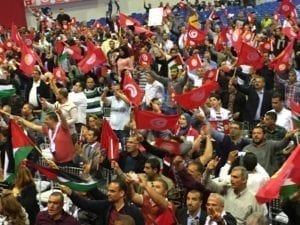
Tunisian workers and their unions were key to the country’s democratization. Credit: Solidarity Center/Tula Connell
Studies show that unequal economies reinforce distrust in government and threaten democracy. Addressing economic inequality means ensuring worker rights are strengthened. And strong worker rights are the underpinning to vibrant democracy.
“The freedoms of speech, assembly and association are the essence of any democracy,” says Barbara Unmüßig, president of the Heinrich Böll Foundation. “Their restriction poses a challenge to democratic governments and global cooperation.
“This issue must become part of foreign and development policy as well as human rights discussions, taken up by national parliaments and integrated globally into intergovernmental discussions and negotiations,” says Unmüßig.
As the report to the UN on freedom of assembly and association asserts: “Labor rights are human rights, and the ability to exercise those rights in the workplace is a prerequisite for workers to enjoy a broad range of other rights, whether economic, social, cultural, political or otherwise.”
“Democracy and human rights, like freedom of association, create equality in front of power, even the playing field and unleash the innovation of citizens that governments need to govern well,” says Solidarity Center Executive Director Shawna Bader-Blau.
Freedom of assembly, association, and speech are anchored in the 1948 Universal Declaration of Human Rights, and long established in international law and many national constitutions. By working to ensure workers have the freedom to exercise their rights, unions and the workers they represent, accompanied by human rights champions around the world, are the strongest and most effective solutions to the ongoing crisis of closing space choking democracies worldwide.
“In the past 50 years, so many major transitions to democracy have had social movements front and center,” says Bader-Blau.
“South African unions helped end apartheid. And for the role they played in transforming Tunisia, the labor movement there won the Nobel prize. Freedom of association is what revives and builds democracies, and gives us all a chance to promote economic and political rights simultaneously.”
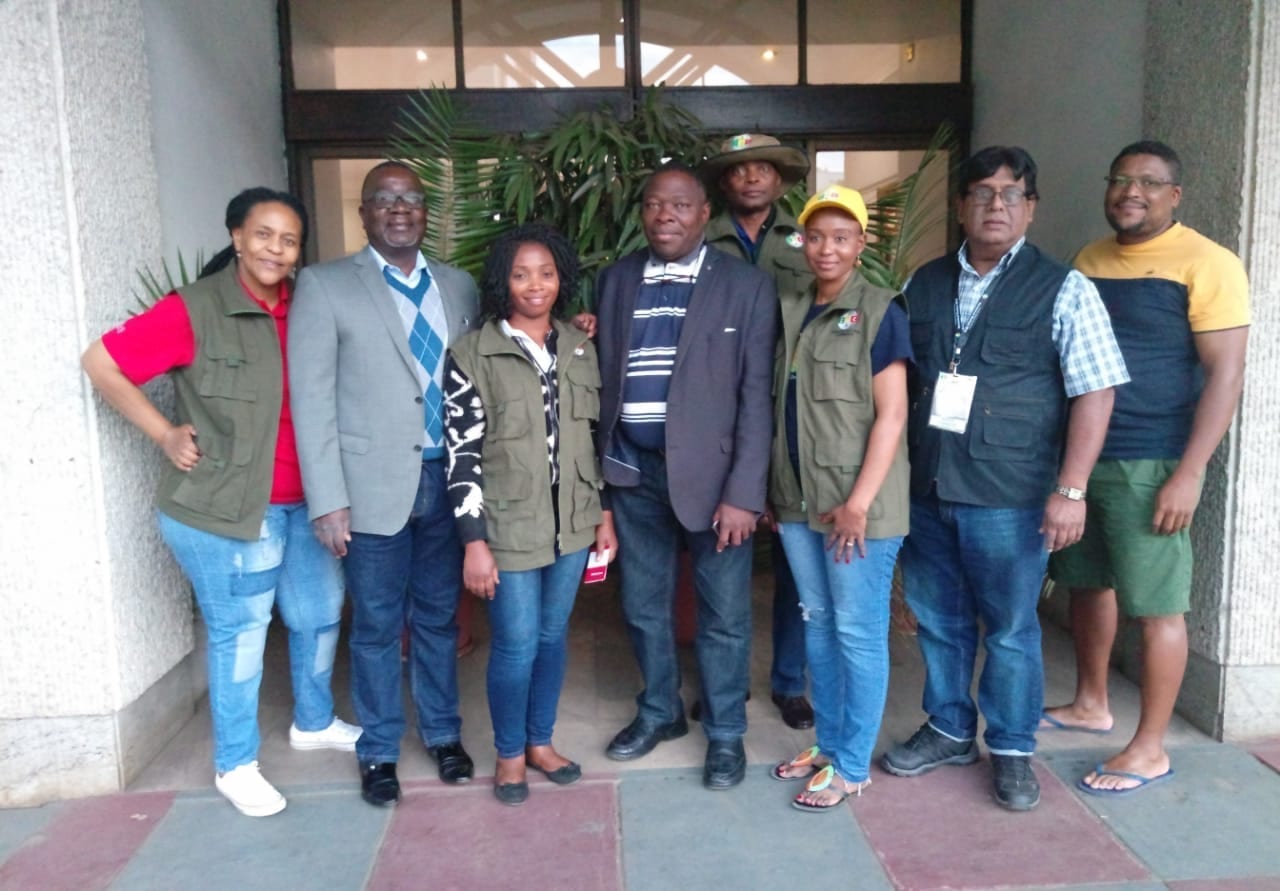
Aug 2, 2018
Workers’ Delegation Reports on Violence, Zimbabwe Election
Representatives of nine southern African trade union federations and the regional trade union organization, Southern Africa Coordination Council (SATUCC), reported a situation that went from calm on Monday to violent yesterday, as protesters vented anger at the delayed announcement of polling results in Harare, Zimbabwe’s capital.
As Zimbabweans lined up to choose a new president, the labor delegation observed a day unmarred by violence or intimidation. The situation deteriorated, however, as time wore on with no clear winner announced. Crowds gathered. According to news reports, six people were killed in clashes between opposition protesters and security forces. Bullets were fired into the third-floor offices of the country’s labor federation, the Zimbabwe Congress of Trade Unions (ZCTU).
The SATUCC election observation delegation—which had fanned out across Zimbabwe to observe the country’s historic election, the country’s first since the ruling ZANU-PF party ousted its 30-year president, Robert Mugabe—reported that polling day was peaceful. The 14-person delegation of trade union leaders representing federations in Botswana, Malawi, Mauritius, Mozambique, Namibia, Swaziland, Tanzania, Zambia and Zimbabwe traveled in six teams led by Solidarity Center staff members, who were also credentialed election observers, to polling places in several provinces and Harare to observe election processes and collect data for a joint report.
“We haven’t witnessed any difficulties and no cases of violence or injury in the polling stations we have visited,” said delegation member, Cosmas Mukuka, Zambia Congress of Trade Unions (ZCTU) secretary general, and deputy vice president, SATUCC, on Monday.
This election is Zimbabwe’s first since long-time ruler and head of the ZANU-PF party, Robert Mugabe, was removed by his own party and replaced by Emmerson Mnangagwa. Nelson Chamisa, leader of the main opposition party, the Movement for Democratic Change (MDC), was endorsed by the ZCTU. During previous elections, the government was accused of maintaining its hold on power through rigged elections and violence against supporters of the opposition party.
Full election results are not due until later this week. Both the ruling party and the main opposition party are declaring victory.
“Every Zimbabwean is hoping for better days to come,” said Peter Mutasa, president of Zimbabwe Congress of Trade Unions (ZCTU) and General Secretary of Zimbabwe Banks and Allied Workers Union prior to the election.
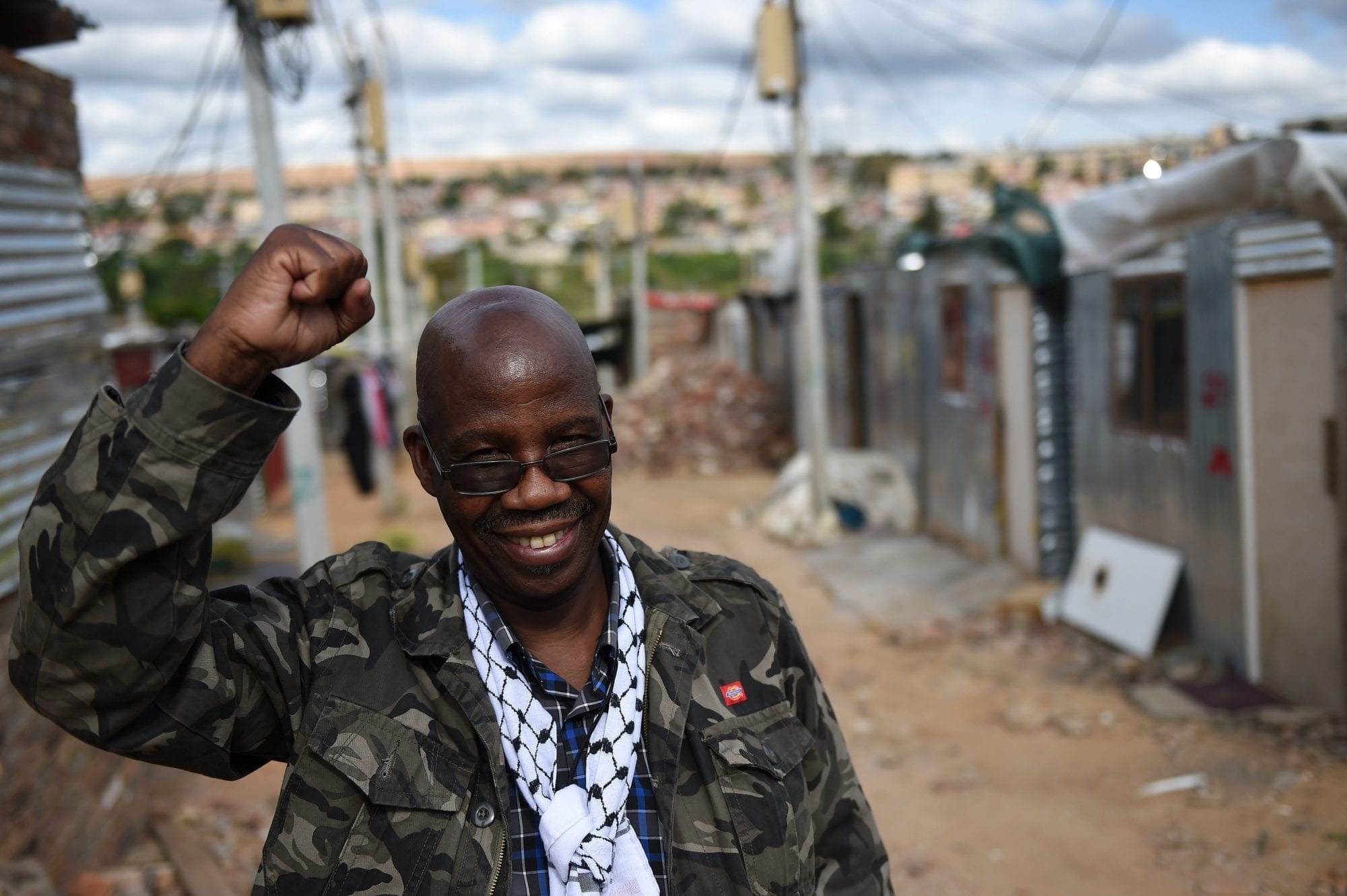
Aug 2, 2018
The Constitutional Court of South Africa determined in a historic ruling late last week that workers placed by labor recruiters must be made permanent after three months at the company where they worked on temporary status, entitling them to the same pay, benefits and job security afforded to full-time employees, but labor organizations expect a protracted fight to enforce the ruling.
Zwelinzima Vavi, general secretary of the South African Federation of Trade Unions’ (SAFTU), described the victory as “unprecedented,” congratulating the National Union of Minworkers of South Africa (NUMSA) for its successful—almost four-year battle—through South Africa’s labor courts and the Constitutional Court.
The ruling puts employers on notice, he said. “Sorry, you are going to have to treat all workers the same” finally giving meaning to the ILO Convention which requires equal pay for work of equal value,” said Vavi in a broadcast interview.
However, the Court stopped short of banning labor recruiting, or broking, outright, for which South Africa’s unions and federations have long advocated. Short of a ban, workers say, trade unions and labor federations expect challenges to ensuring enforcement of the ruling.
Sizwe Pamla, a spokesperson of the Congress of South African Trade Unions (COSATU), said it was unfortunate that the ruling still “justified” labor brokers, whom he said were “trading in workers.”
NUMSA’s general secretary, Irvin Jim warned that workers “still remain vulnerable” under the new ruling because recruiters “will try to do every trick: They will try to replace the worker before three months [end]; they will try to remove him.”
South Africa’s workers have long argued that employers use so-called “temporary” workers to avoid the higher cost of employing permanent workers, an arrangement from which labor brokers profit.
To enforce the ruling, Vavi said, unions and federations must educate workers about their new rights under this ruling.
The Constitutional Court verdict overturns a 2015 judgment that labor recruiters and their clients are dual employers, thus making employers the direct responsible parties for all workers in their workplace after three months. Temporary workers earning $15,500 per year or less are covered by the ruling.
Labor recruitment in South Africa generated more than 2.5 billion U.S. dollars in 2013, employing over 1 million so-called temporary workers, or 7.5 percent of total employment.
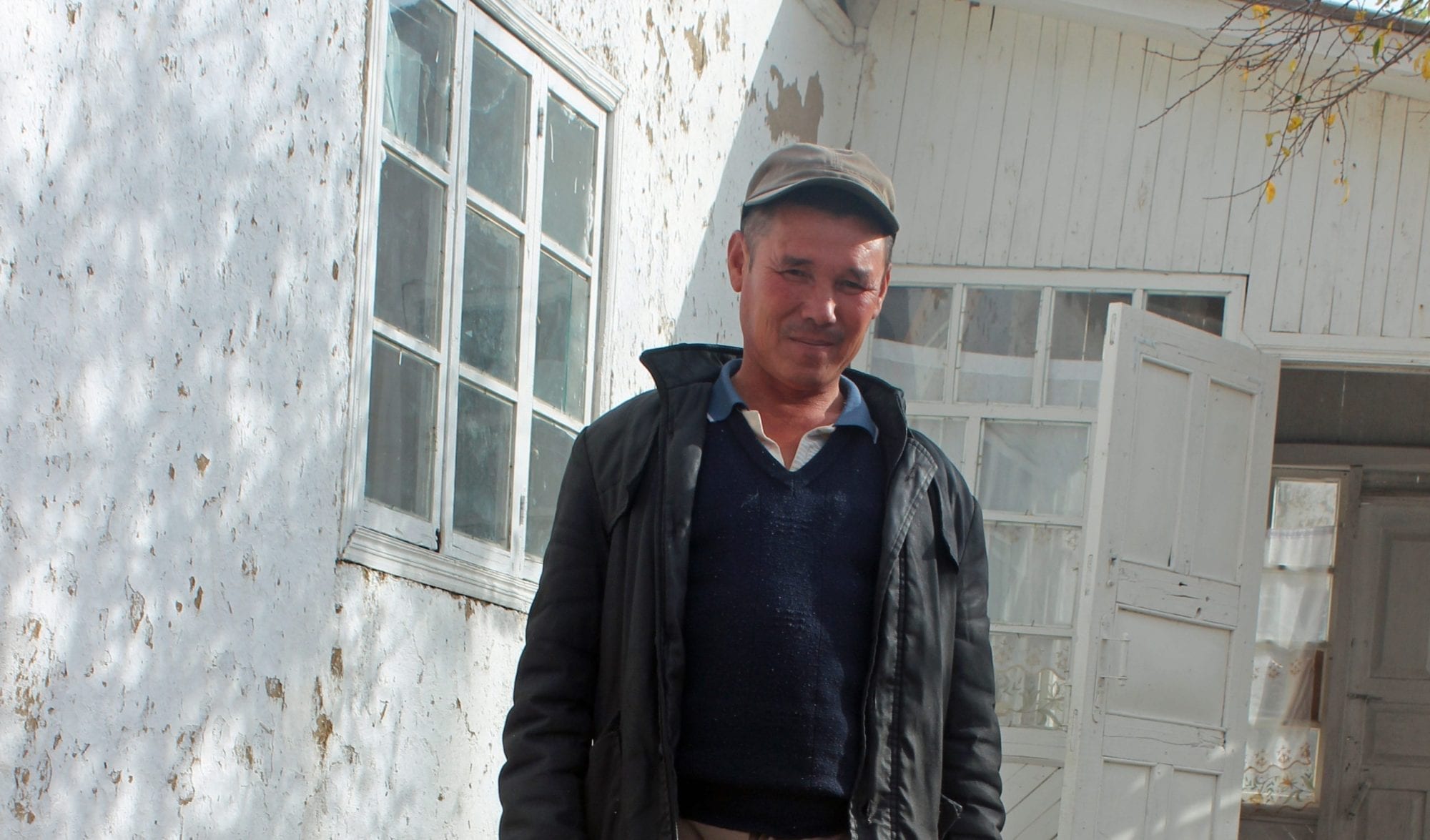
Jul 27, 2018
Aldaberdi Karimov, 42, who lives in a remote Kyrgyzstan village in the Batken region, did not want to migrate from his country to find work to support his family, including his daughter, Ak Maral, now 5 years old.
But like many in Kyrgyzstan, where remittances from workers abroad make up more than 25 percent of the country’s gross domestic product, Karimov faced the heart-wrenching decision to leave his family to find employment. In fact, so few good jobs are available in the country, especially for workers in rural areas, only 24 percent of Kyrgyz workers are employed in the formal economy.
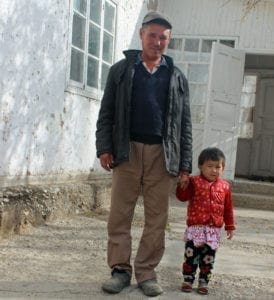
Aldaberdi Karimov escaped from forced labor and is back in his Kyrgyz village with his family, including his daughter, Ak Maral. Credit: Solidarity Center
And when he left his village, Karimov had no idea he would be a target of force labor and human trafficking. Globally, more than 21 million people are in forced labor, according to the International Labor Organization, which on July 30 marks World Day against Trafficking in Persons.
Forced to Live with Cows in the Barn
Karimov first sought jobs in Russia and then migrated to Kazakhstan, where he worked as a market vendor in Almaty, Kazakhstan’s largest city. Karimov thought he would fare better in Kazakhstan because, like Kyrgyzstan, it is a member of the Eurasian Economic Union.
Between 100,000 to 150,000 Kyrgyz were registered in Kazakhstan at the end of 2017, figures that do not reflect many who are not registered, according to a new report by the International Federation for Human Rights (FIDH). Most work without written contracts or on contracts that do not adequately protect their rights. Their passports typically are confiscated by employers, making it difficult for them to leave abusive jobs, and they have no access to labor protections like safe working conditions and paid leave.
Karimov could not afford the permit needed to sell goods legally in Kazakhstan—costing between $1,500 and $2,000, a permit is the equivalent of a year’s wage. Through an intermediary, he and his brother, Giyazidin, were led to a job on a Kazakh farm in June 2016 tending 100 cows and 2,000 sheep. The farmer said he would pay them 40,000 tenge ($117) each per month.
“The employer promised to pay us not every month, but once every three or four months,” Karimov says. “After three months, we asked for an advance and our employer became very angry and said that the cows and sheep are very thin, so he is not going to pay yet.”
By October, they each had been paid only $100 for six months’ work. Frost and cold rains began and when the brothers asked to be housed in a warmer environment than their small thatched hut in the field, the employer told them to live with the cows and rams in the barn.
Tens of Thousands of Workers in Forced Labor in Kazakhstan
Essentially trapped in forced labor, the brothers made their escape after Giyazidin became so ill that the farmer took him to the hospital. Tens of thousands of workers are estimated to be victims of forced labor in Kazakhstan, with migrant workers from Kyrgyzstan, Tajikistan and Uzbekistan forced to labor in agriculture, construction and the extraction industry.
Like many migrant workers, neither Karimov nor his brother reported their abuse to the police because they did not trust them. In fact, officers of law enforcement agencies often are the link between migrant workers and “buyers” of labor, according to the FIDH report.
Karimov says lack of a labor contract and no police protection left him and his brother vulnerable to human traffickers and inhumane working conditions. Around the world, most migrant workers are denied the right to form unions and bargain with their employer—a fundamental freedom that enables abuse and exploitation. “The lack of labor agreements entails forced labor and even slavery,” says Aina Shormanbayeva, president of the Legal Initiative, a Kazakhstan-based public foundation.
Now back in his village, Karimov says migrating for jobs is now out of the question, even as he searches for work, still seeking wages that will enable him to support his family










